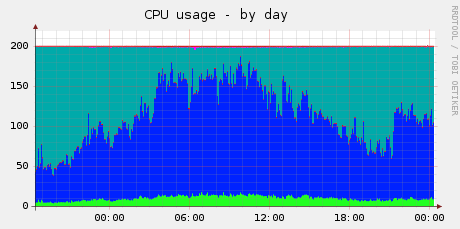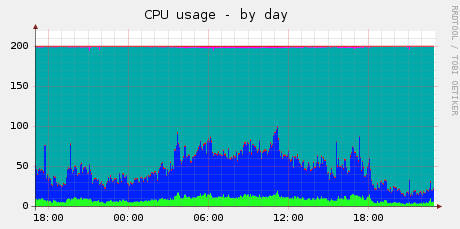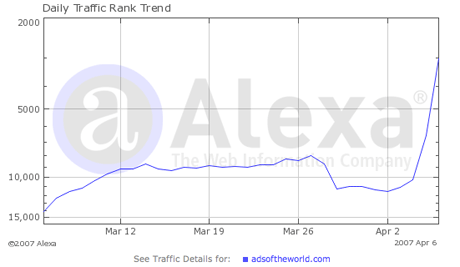 digg.com is a global top 100 site and it’s all about sharing links, so you can expect a lot of traffic once you get on the front page. Here is some advice on what you should do to make this happen, how to prepare and what to expect. Among other tips, learn how to get notified if someone submitted your site to digg.
digg.com is a global top 100 site and it’s all about sharing links, so you can expect a lot of traffic once you get on the front page. Here is some advice on what you should do to make this happen, how to prepare and what to expect. Among other tips, learn how to get notified if someone submitted your site to digg.
Recently I got some experience with digg and I want to share my learnings with you. Last november a creativebits article made the digg front page. A fellow creativebits author’s site, Macintalk got dugg recently as well. Finally two days ago an Ads of the World post was made popular too.
Get good hosting
Before anything else, if you are planning on being dugg, make sure you have the proper hosting. Big number of links made popular on digg die within 15 minutes of hitting the front page from too many requests.
I have a strong dedicated server running under both creativebits and Ads of the World, so I didn’t have this problem. They held up perfectly without any slowdown. Of course I was lucky that with Ads of the World I got dugg on a weekend, so the normal traffic was relatively low. Shared servers in general will not survive digg or they will slow down so much it becomes a hassle. Load balanced servers have a good chance for survival and well set-up dedicated servers are the best of course.
Optimize your page
Even if you have good hosting, you should make sure your site’s engine is ready to take the many thousands of hits per hour. Up to 50K page loads an hour. Most dynamic websites use lot of CPU cycles to serve a page. If your server’s CPU runs at 100% and the memory gets full, your server will start using the HD as a scratch disk. This will further slow down everything. Eventually all will crash and your server will become unresponsive. Effectively your site suffers a DOS attack.
Every site engine works in different ways and the process I described is a crude description of what actually happens between apache, php, mysql, HD, memory and CPU. What you should remember is that you need to optimize the page. Of course I’m not suggesting hacking the engine, as it requires serious programming knowledge. But you can get rid of all the unnecessary bells and whistles easily.
Some engines like Drupal has the feature to switch on different levels of page caching and throttling which greatly reduces the load for anonymous users (readers who are not logged in). Avoid blocks with dynamic content on your pages or switch them off if you’re expecting to hit the digg home page. Optimize your images and CSS files, so they take less time to serve as well.
Accelerate PHP
If you can install a php accelerator such as eaccelerator. If you don’t know how, ask your hosting company or a specialist if they can do it for you. Thanks to 2bits for fixing it for me. This simple step reduced the load on my server overall by at least 50%.

CPU load on an average day before eaccelerator.

CPU and memory utilization both dropped significantly after enabling eaccelerator.
Create popular content
 Now that you’re ready to be dugg, make sure you have the right content.
Now that you’re ready to be dugg, make sure you have the right content.
Although digg readers in general are well read and well informed geeks, unfortunately things hitting the front page in big average are of a little lower quality than the very best of the internet. This is the nature of democratic systems. Since digg works based on votes, it’s the majority of readers decide what deserve to be on the front page, not editors. Therefore content that is easy to consume, simple and appeals to a wide audience is usually what gets dugg.
Content that is too high brow, very detailed, scientific, technical or a serves a niche interest is less likely to be dugg. The majority of people don’t have either the intellect, interest or patience to consume and evaluate such high quality content. And, hey, we are all up for some lighthearted content now and then. Of course this is a big generalization and there are exceptions to this rule of thumb. I’ve seen many top quality, intelligent articles hitting the front page too.
Make it easy for your users to digg you
For every engine there are plugins that make it easy for people to submit your articles to digg. See the bottom of this article. It has a couple of small icons and one of them is digg. If you click it you will be submitting this article to digg. If the article is already submitted you will be able to vote on it. This little feature greatly increases your chances of your content to be submitted. Remember, you’re not allowed to submit your own articles as it is considered spamming, so you have to rely on your readers to do it for you.
Nowadays many blogs even include a digg counter right on their pages. While I think this is too much, I’m sure this trick further increases the chances of getting dugg.
Each digg post requires a short description of the story. Therefore, offer a two sentence introduction to your article at the very beginning of your article that summarizes it. Submitters can simply copy and paste this to their submissions. It takes an effort to summarize an article and humans naturally don’t like to swim against the stream.
Not every digg user is equal
Different users on digg have different weight. Users with many friends and good history have a bigger chance to hit the front page. Therefore I suggest don’t try and ask your friends to submit your articles for you. Unless they are top diggers it’s very unlikely that your article will hit the front page this way. If a piece of content that you worked on hard is already submitted by your friend and sitting there in the queue with only 2 diggs you will lose the chance to be noticed and submitted by one of the popular diggers. Don’t try to cheat the system. Be patient, wait till you get dugg organically. Sometimes it takes weeks till your jewel piece of content gets submitted.
Help start it off
Newly submitted articles appear in the upcoming queue with initially just one vote from the submitter. New articles are submitted literally every second. If you roll off the first page of upcoming stories with just one vote, you’re unlikely to ever hit the front page.
Remember, you only have 24 hours to get to the front page. After that, even if you are dugg by a thousand people your link will not be promoted to the front page.
Most diggers who check the upcoming articles will check out articles that have at least 3-4 diggs to begin with. Therefore they are more likely to vote for those articles too. It’s a bit of a sheep effect. We tend to look at stuff that others liked rather than being objective and give every story the same attention and chance. So, help your article at the beginning and digg it yourself.

Now, how will you know if a page from your site is in the upcoming queue? Here is the tip I teased you about in the beginning. Do a search on digg on your domain and sort it by newest first. Once you have the results press the RSS icon in the address bar and subscribe to the feed. Every time there is a new item in the upcoming list your RSS reader will notify you.
Get noticed by top diggers
How do you get noticed by top diggers? Well, ironically one of the best places to reach top diggers is digg itself. Comment on digg stories. When commenting do link your site in an appropriate manner. Do it only when the linked article is relevant and gives further information or a different angle to the story being discussed. Do not comment exclusively to plug your link. Diggers will check out your link if appropriate and some of them may bookmark your site or sign up to your RSS feed if it’s worthy of their attention. Eventually they may find something on your site they will want to submit to digg.
Off peak hours are good too
You would think that week days are better to be dugg, but not necessarily so. On weekdays the number of articles hitting the front page of digg is much larger, therefore your story will roll off from the front page much faster. On weekends everything is slower. This is good because you don’t get that big of a traffic spike and you will get visitors for a longer extended period. Of course if your server can take it, get dugg any time.
The peak
How will your stats look like when dugg? Well, much depends on the subject, but judging from the three digg stats I’ve seen, you will get at least 25K+ unique visitors within 48 hours. If your server breaks, this number can be significantly lower, but if your server holds up fine it can be significantly higher too.
creativebits’ article about the first version of Photoshop received about 30K visitors last November. Notice that the number of reads below the article don’t reflect this number as the counter was switched off during the critical hours to save on CPU cycles.
In case of Ads of the World a post about a Durex condom ad got 125K+ unique hits. Of course digg grew in number of readers since last November which accounts partly for this increase in numbers. The other reason is people click on everything that has a slight hint of sex. As digg grows even bigger, we can only expect these numbers to increase further.

The chart shows the first day of the digg effect on Ads of the World.
People coming through a link from digg read 2 pages in average on the linked site. So, most people check out the linked page and one more. That’s pretty good in my opinion. Seems readers don’t just arrive and bounce immediately, but do check around occasionally.
The after effects
The after effects are rather pleasant. The domino effect kicks in within 24 hours. You will receive traffic from dozens of different sites including the Spanish digg clone meneame linking not only your original article that was dugg, but other content as well. Within a week the mainstream media will pick it up too. You will likely have an increase in traffic on your site on long term as well, as at least 1% of the visitors from digg and other sites will remain regular RSS subscribers.
Monetary benefits
Unless your site is selling products, don’t expect a very big increase in your revenue for being dugg. Digg readers rarely click on AdSense ads. The more tech savvy your audience is, the less likely they will be prone to ads as they can easily tell content from advertising.

Your Alexa rank however will skyrocket for the week you’ve been digged as a high percentage of digg users use the Alexa toolbar or other tools reporting to Alexa. This will help you increase the price of your Text-Link-Ads.
Interesting facts
75% of diggers live in the USA. At least 50% of digg users surf using Firefox and they have a monitor with resolution 1024×768 or bigger. Circumstantial evidence showed that while prayers did not help, crossing your fingers did increase the chances of getting dugg.
